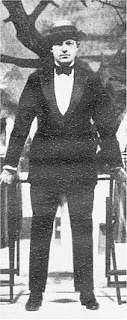As I was just five years old at the time, my role in Franklin Roosevelt's campaign for a fourth term in 1944 was limited. With war in Europe and the Pacific still to be won, the president made just one campaign appearance in New York that year, an all-day motorcade through fifty-one miles of streets in Manhattan, Brooklyn, and Queens. The weather was miserable -- cold and rainy -- and FDR rode coatless, sometimes hatless, in an open car. His route included Fourth Avenue in Bay Ridge. That's where we were standing. As the presidential Packard approached, Dad hoisted me aloft and I saw several people ride by, one of whom was FDR.
About six months later I was sitting on the livingroom floor listening to the console radio when I heard an announcer say that President Roosevelt was dead. Mom was out shopping. When she got home she already knew; people had heard the news and poured out into the streets, some weeping, even in Republican Bay Ridge. The trauma, intensified by wartime uncertainty, was bipartisan; we'd lost our commander-in-chief. That evening my parents listened to WQXR, which played a program of the president's favorite music.
By 1948 my Democratic DNA had fully asserted itself and I was as ardent a rooter in politics as in baseball. Of course nobody thought Truman would beat Dewey. I remember a September or October issue of Life magazine, to which we subscribed, with a full-page photo of Dewey and his entourage on a New York ferry. The caption referred to him not by name, but as "our next president."
I have two distinct radio memories of that fall campaign. One was a fiery Truman speech, delivered, I think, to a labor audience. The president was berating the Republicans, giving 'em hell about the Taft-Hartley bill. I had no idea what Taft-Hartley was, but I was deeply stirred when the president proclaimed to thunderous applause, "The Democrats are right and the Republicans are wrong!" On the Dewey side was a radio special of his, called The Victory Express hosted by Robert Montgomery. It was all celebrity guests and gloss and smug complacency, anticlimaxed by a bland speech by the candidate.
I also remember a telling incident from a newsreel. At some midwestern whistlestop Dewey was speaking from the back of his train. Suddenly the train lurched backward, dangerously close to the crowd. "That's the first lunatic I've ever had for an engineer," quipped the candidate. "He should probably be shot at sunrise." Mister Warmth.
Commentators have recently looked to history for a candidate comparable to Mitt Romney. Dewey is the one Romney reminds me of: polished, plastic, charmless, and content-free.
My contrasting radio and newsreel impressions of the two candidates gave me hope. Emboldened by my spot-on prediction that the Cleveland Indians would beat the Boston Braves in six games, I announced to my parents that Truman was definitely going to beat Dewey.
This belief made me an embattled minority on 71st Street, where I played my small but crucial role in the Truman campaign. Practically all my friends were Republicans. Debates raged daily, at approximately the same level of reason, logic, and volume as the arguments during our stickball games. We weren't debating the merits of Taft-Hartley or the reconstruction of postwar Europe. The main issue hit closer to home: Republican kids were spreading the vicious rumor that if Truman were elected, the Democrats would make us all go to school on Saturdays. It was a tough charge to rebut. The best I could do was, "They will not."
On election night I listened nervously to my bedside radio as the results slowly trickled in. It was too close to call. Truman seemed to be ahead but pundits were saying that when the votes from the west were counted, Dewey would pull ahead and win. (Thus was born my lifelong distrust of political pundits.) This was the state of things when I went to sleep.
When I came downstairs the next morning, Mom and Dad were all smiles as the radio bulletins confirmed that Truman had pulled off the biggest upset in political history. I'd called it! I couldn't wait to go to school and gloat.
Soon the election was forgotten and our kid-disputes returned to more quotidian topics, like stickball ground-rules and whether the Dodgers were as good, position-for-position, as the Yankees.









